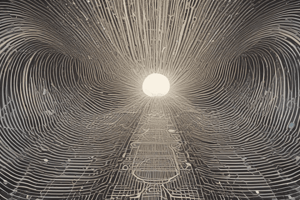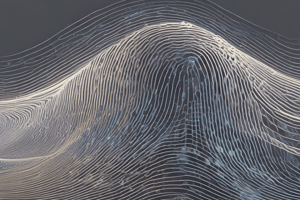Podcast
Questions and Answers
What is the term used to describe the movement of a body from its mean position to the maximum displacement in an oscillation?
What is the term used to describe the movement of a body from its mean position to the maximum displacement in an oscillation?
- Amplitude (correct)
- Frequency
- Time period
- Vibration
What happens to the amplitude of oscillation for a body oscillating in the air?
What happens to the amplitude of oscillation for a body oscillating in the air?
- Gradually decreases (correct)
- Becomes zero
- Gradually increases
- Remains constant
In the context of oscillation, what does the time period refer to?
In the context of oscillation, what does the time period refer to?
- Time taken to complete one oscillation (correct)
- Maximum displacement of a body
- Number of oscillations per second
- Rate of to-and-fro movements
What is the relationship between frequency (v) and time period (T) of an oscillating body?
What is the relationship between frequency (v) and time period (T) of an oscillating body?
What unit is used to measure the frequency of oscillation?
What unit is used to measure the frequency of oscillation?
Which term refers to rapid to-and-fro movements of a body about its mean position?
Which term refers to rapid to-and-fro movements of a body about its mean position?
In the context of sound production, what is responsible for producing sound in humans?
In the context of sound production, what is responsible for producing sound in humans?
What aspect of motion is described as 'from A to B, B to C, and then from C to A' in an oscillation?
What aspect of motion is described as 'from A to B, B to C, and then from C to A' in an oscillation?
What feature distinguishes one complete oscillation from another?
What feature distinguishes one complete oscillation from another?
'Sound is produced by a vibrating body.' What type of motion in a vibrating body leads to sound production?
'Sound is produced by a vibrating body.' What type of motion in a vibrating body leads to sound production?
Flashcards
Amplitude
Amplitude
Maximum displacement from the mean position during oscillation.
Decreasing Amplitude
Decreasing Amplitude
The gradual reduction in amplitude of an oscillating body due to air resistance.
Time Period (T)
Time Period (T)
The time required for an oscillating body to complete one full cycle of motion.
Frequency (v) and Time Period (T) Relationship
Frequency (v) and Time Period (T) Relationship
Signup and view all the flashcards
Frequency Unit
Frequency Unit
Signup and view all the flashcards
Vibration
Vibration
Signup and view all the flashcards
Human Sound Production
Human Sound Production
Signup and view all the flashcards
'To-and-fro' motion
'To-and-fro' motion
Signup and view all the flashcards
Complete Oscillation Feature
Complete Oscillation Feature
Signup and view all the flashcards
Vibrational Sound Production
Vibrational Sound Production
Signup and view all the flashcards
Study Notes
Key Concepts of Oscillation
- Displacement in Oscillation: The movement from the mean position to the maximum displacement is referred to as amplitude.
- Amplitude in Air: When a body oscillates in air, its amplitude may gradually decrease due to air resistance, leading to damping of the oscillation.
- Time Period: The time period is the duration taken to complete one full cycle of oscillation.
- Frequency and Time Period Relationship: Frequency (ν) is inversely related to the time period (T), expressed as ν = 1/T.
- Unit of Frequency: The unit for measuring frequency is Hertz (Hz), which represents cycles per second.
- Rapid Motion: The term for rapid to-and-fro movements of a body about its mean position is called vibration.
Sound Production
- Source of Sound in Humans: Sound is produced by the vibrating vocal cords in humans.
- Oscillation Motion Description: The motion described as 'from A to B, B to C, and then from C to A' outlines the path of oscillation over a complete cycle.
- Complete Oscillation Feature: A complete oscillation consists of a distinct amplitude, which differentiates it from another complete oscillation.
- Type of Motion for Sound: The vibratory motion of a body is responsible for sound production, leading to pressure waves in the air.
Studying That Suits You
Use AI to generate personalized quizzes and flashcards to suit your learning preferences.




